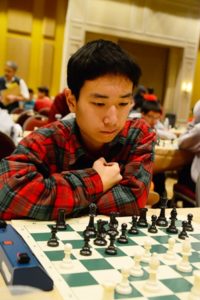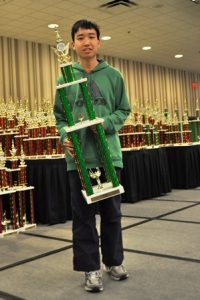By Dakota Antelman, Contributing Writer
Westborough – A YouTube video posted in 2014 shows Westborough High School senior Andrew Liu hiding his high value pieces behind a wall of low value ones for most of a chess match. Then, in a flurry of moves, he swings all his pieces out from behind his defense and seizes control of the match.
Liu’s opponent, then 15-year-old Christopher Gu, saw his own defense collapse and soon conceded defeat, a loser at the hands of a unique and unorthodox playing style that Liu, used to secure six national chess championships in six years.
Liu no longer plays as much as he used to. Instead, he teaches, passing his own insight and innovations on to younger players of the game he loves.
“It’s mainly a desire to share the feeling that chess has given me,” Liu said. “Ever since I started looking at chess, I’ve had this wonder, that’s one of the best things that chess gives me.”
Liu taught an online chess class throughout this past summer, leading hour-long lessons for over 100 students. Liu taught the classes using a combination of Skype, chat rooms and a computer program that allowed students to play each other online.
Liu explained that many of his students came to him with an already impressive command of the game. In those cases he said he broke from chess tradition and opened up the nuances of his own strategy for his students to see and learn.
“Every strong chess player has found their own home-cooked dangerous idea that they can call their own,” Liu said. “They never reveal it. They hide it and then shock their opponents. But for me, whenever I have a new idea, I have this urge to share it. My body can’t contain all that fascination.”
For Liu, this style of innovating the sharing is a way of both finding excitement in chess and leaving his own mark on a game that is already well over a thousand years old.
“That’s the most amazing part [of chess], when you have that eureka moment where you make a discovery and you find that new idea that can contribute to the game,” Liu said. “That’s the most warm, most wonderful, fascinating feeling ever.”
Liu partially credits the way he learned chess with giving him such a fundamentalist approach to the game. He was almost entirely self-taught, first learning from a “Chess for Dummies” handbook, and later finding videos of professional chess matches, studying them, and memorizing the maneuvers that the competitors used. He did not even have a professional coach until after he placed fourth at a national championship in 2011. This introduction to chess left him with an unorthodox playing style that baffled his opponents when he made his national debut in 2011.
Liu opened with what was called a “hippo” defense, where a player keeps their pieces close to their starting positions without making big moves onto the opponent’s side of the board.
“It was known to be this really trash, garbage setup but I really liked it and I played it every game, even against the top players,” Liu said. “I became a huge expert at it because I played it every game and it really caught them off guard. It became the weird thing I was known for when I started playing. I was the kid with the weird setup.”
Since then, Liu has left the hippo defense behind. He has studied other strategies for starting a game and developed a deep repertoire of so-called openings. In fact, many of his original contributions to chess strategy are themselves openings.
Liu revealed some of these strategies, and other specific methods of attack to his students this summer. He said that doing this may cost him at future competitions.
“By giving them out, when one of my opponents looks me up and try to prepare for me, I’ll be at a disadvantage because they’ll know exactly what I play,” Liu said. “[My opponent will] even know some of the very specific ideas that I have. But I don’t mind that too much.”
For Liu, holding onto his chess secrets serves his hatred of losing. Letting them go and teaching his style to his students serves the opposite — his love of the game.
“Right now, it’s all about sharing why I love it so much. I am sort of competitive in chess, I hate losing, but the love for the game is much stronger.”
















